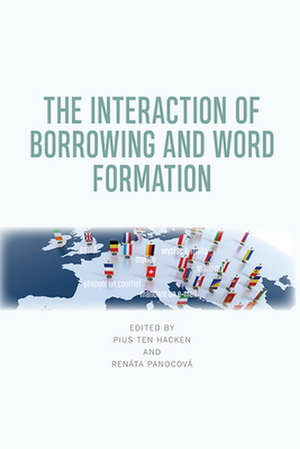The Interaction of Borrowing and Word Formation
Editat de Pius Ten Hacken, Renáta Panocováen Limba Engleză Paperback – 3 mar 2022
| Toate formatele și edițiile | Preț | Express |
|---|---|---|
| Paperback (1) | 174.42 lei 3-5 săpt. | |
| EDINBURGH UNIVERSITY PRESS – 3 mar 2022 | 174.42 lei 3-5 săpt. | |
| Hardback (1) | 615.33 lei 3-5 săpt. | |
| EDINBURGH UNIVERSITY PRESS – 12 mar 2020 | 615.33 lei 3-5 săpt. |
Preț: 174.42 lei
Preț vechi: 194.29 lei
-10% Nou
Puncte Express: 262
Preț estimativ în valută:
33.38€ • 34.92$ • 27.72£
33.38€ • 34.92$ • 27.72£
Carte disponibilă
Livrare economică 12-26 martie
Preluare comenzi: 021 569.72.76
Specificații
ISBN-13: 9781474448239
ISBN-10: 1474448232
Pagini: 312
Dimensiuni: 157 x 233 x 22 mm
Greutate: 0.45 kg
Editura: EDINBURGH UNIVERSITY PRESS
ISBN-10: 1474448232
Pagini: 312
Dimensiuni: 157 x 233 x 22 mm
Greutate: 0.45 kg
Editura: EDINBURGH UNIVERSITY PRESS
Notă biografică
Pius ten Hacken is a Professor and Chair in the Department of Translation Studies at Leopold-Franzens-Universität Innsbruck. Pius has authored and contributed to several books and journals. He is author of Chomskyan Linguistics and its Competitors (Equinox, 2007), editor of The Semantics of Compounding (CUP, 2016), and co-editor of Word Formation and Transparency in Medical English (Cambridge Scholars Press, 2015) and The Semantics of Word Formation and Lexicalization (EUP, 2013).
Renáta Panocová studied English and Russian in PreSov (Slovakia), then did a PhD in linguistics with specialization in Slavic Studies and Slavic languages. She completed her Habilitation at Faculty of Arts, Pavol Jozef safárik University in KoSice. She is the author of Categories of Word Formation and Borrowing: An Onomasiological Account of Neoclassical Formations, (Cambridge Scholars Publishing, 2015) and The Vocabulary of Medical English: A Corpus-based Study (Cambridge Scholars Publishing 2017), and is co-author with Pius ten Hacken of Word Formation and Transparency in Medical English (Cambridge Scholars Publishing 2015).
Renáta Panocová studied English and Russian in PreSov (Slovakia), then did a PhD in linguistics with specialization in Slavic Studies and Slavic languages. She completed her Habilitation at Faculty of Arts, Pavol Jozef safárik University in KoSice. She is the author of Categories of Word Formation and Borrowing: An Onomasiological Account of Neoclassical Formations, (Cambridge Scholars Publishing, 2015) and The Vocabulary of Medical English: A Corpus-based Study (Cambridge Scholars Publishing 2017), and is co-author with Pius ten Hacken of Word Formation and Transparency in Medical English (Cambridge Scholars Publishing 2015).
Cuprins
List of contributors; List of figures and tables; Preface
Chapter 1: Word formation, borrowing and their interaction
Pius ten Hacken and Renáta Panocová
Chapter 2: Compounding and contact
Brian D. Joseph
Chapter 3: Neoclassical compounds between borrowing and word formation
Renáta Panocová and Pius ten Hacken
Chapter 4: Borrowed compounds, borrowed compounding - Portuguese data
Alina Villalva
Chapter 5: Compound calques in an 18th century German-Lithuanian dictionary
Bonifacas Stundzia
Chapter 6: (Pseudo-)Anglicisms as nominal compounds in Italian
Silvia Cacchiani
Chapter 7: The role of borrowing in the derivation of passive potential adjectives in Polish
Maria Bloch-Trojnar
Chapter 8: How an 'Italian' suffix became productive in Germanic languages
Camiel Hamans
Chapter 9: The suffixes -ismus and -ita in nouns in Czech
Magda sevcíková
Chapter 10: The Interaction between Borrowing and Word Formation: Evidence from Modern Greek prefixes
Angeliki Efthymiou
Chapter 11: Loan word formation in minority languages: Lexical strata in Titsch and Töitschu
Livio Gaeta and Marco Angster
Chapter 12: Examining the integration of borrowed nouns in immigrant speech: the case of Canadian-Greek
Angela Ralli and Vasiliki Makri
Chapter 13: Interaction among borrowing, inflection, and word formation in Polish Medieval Latin
Michal Rzepiela
Chapter 14: Trends in the interaction between borrowing and word formation
Pius ten Hacken and Renáta Panocová
Chapter 1: Word formation, borrowing and their interaction
Pius ten Hacken and Renáta Panocová
Chapter 2: Compounding and contact
Brian D. Joseph
Chapter 3: Neoclassical compounds between borrowing and word formation
Renáta Panocová and Pius ten Hacken
Chapter 4: Borrowed compounds, borrowed compounding - Portuguese data
Alina Villalva
Chapter 5: Compound calques in an 18th century German-Lithuanian dictionary
Bonifacas Stundzia
Chapter 6: (Pseudo-)Anglicisms as nominal compounds in Italian
Silvia Cacchiani
Chapter 7: The role of borrowing in the derivation of passive potential adjectives in Polish
Maria Bloch-Trojnar
Chapter 8: How an 'Italian' suffix became productive in Germanic languages
Camiel Hamans
Chapter 9: The suffixes -ismus and -ita in nouns in Czech
Magda sevcíková
Chapter 10: The Interaction between Borrowing and Word Formation: Evidence from Modern Greek prefixes
Angeliki Efthymiou
Chapter 11: Loan word formation in minority languages: Lexical strata in Titsch and Töitschu
Livio Gaeta and Marco Angster
Chapter 12: Examining the integration of borrowed nouns in immigrant speech: the case of Canadian-Greek
Angela Ralli and Vasiliki Makri
Chapter 13: Interaction among borrowing, inflection, and word formation in Polish Medieval Latin
Michal Rzepiela
Chapter 14: Trends in the interaction between borrowing and word formation
Pius ten Hacken and Renáta Panocová
